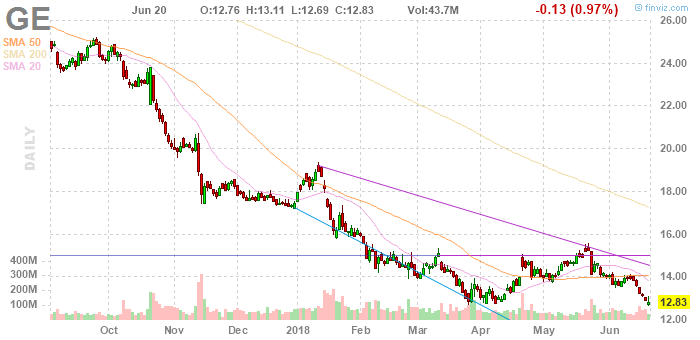General Electric delisted from Dow Jones: General Electric (NYSE:GE) shares extended the downward momentum after the Dow Jones Industrial Average ended its century-long relationship with the electric company. The index, which tracks the stocks of the 30 largest US-based companies, replaced GE with Walgreens Boots Alliance (NASDAQ:WBA).
General Electric Delisted from Dow Jones
GE started trading on the Dow Jones index 122 years ago when Charles Dow first created the index, then consisting of only 12 companies.
Though the Dow Jones has delisted General Electric two times before this in 1989 and 1901, GE’s former transportation CEO Bob Nardelli said that he believes the worst is still yet to come for the company and that it will be quite difficult for GE to retain its spot in the Dow index.

General Electric shares dipped 2% after the announcement. The stock of the struggling industrial company is down more than 50% in the last twelve months. A significant amount of debt, dividend cuts, and restructuring initiatives pulled out a tremendous amount of value from GE shares.
Nardelli also commented that he believes the considerable decline in General Electric shares were weighing on the performance of the Dow Jones Industrial Average over the last year.
Debt and Liquidity Position Slashes Trader Sentiments
GE’s management believes their strategy of cutting dividends, declining capital investments, and selling $20 billion of assets would help in reducing the company’s financial commitment. The company slashed its dividend by 50% at the beginning of this year. Because of this, traders aren’t sure about future dividends.
In a statement about the Dow’s decision, GE said, “We are focused on executing against the plan we’ve laid out to improve GE’s performance. Today’s announcement does nothing to change those commitments or our focus in creating a stronger, simpler GE.”
More Pain is Ahead
Market analysts, however, are seeing more pain for the company and its shareholders in the days to come. Moody’s has dropped the General Electric credit rating to negative, blaming the debt of $135 billion and low cash generation potential for the downgrade. JP Morgan’s Stephen Tusa believes GE will need a significant amount of cash to fulfill its commitments; the firm thinks GE requires $32 billion to stabilize its liquidity position.
>> US Stock Market Indexes Are Under Pressure Amid Escalating Trade War Concerns
Featured Image: geralt via Pixabay










